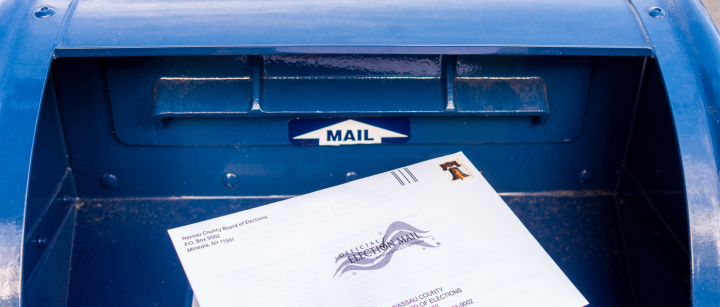Listen to the article
Trump’s Assault on Mail-in Voting and Electronic Voting Machines Based on False Claims
President Donald Trump has launched a renewed attack on mail-in voting and electronic voting machines, announcing plans to eliminate both if elected to a second term. The statements, made on August 18 via his Truth Social platform and later reiterated alongside Ukrainian President Volodymyr Zelenskyy at the White House, contained numerous false or misleading claims about election procedures.
Trump declared he would “lead a movement to get rid of MAIL-IN BALLOTS” and “Highly ‘Inaccurate,’ Very Expensive, and Seriously Controversial VOTING MACHINES.” He stated he was working on an executive order targeting these voting methods, despite significant constitutional limitations on presidential authority in election administration.
Among Trump’s most prominent falsehoods was his claim that the United States is “the only Country in the World that uses Mail-In Voting.” Data from the International Institute for Democracy and Electoral Assistance shows that 11 other nations permit all voters to use mail-in voting, including Canada, Germany, and the United Kingdom. Additionally, 22 other countries allow certain categories of voters to cast ballots by mail, including citizens living abroad or those with disabilities.
The former president also fundamentally mischaracterized the constitutional framework governing U.S. elections, claiming that “States are merely an ‘agent’ for the Federal Government” and “must do what the Federal Government, as represented by the President of the United States, tells them.”
Constitutional experts unanimously reject this interpretation. Kenneth Mayer, professor of American politics at the University of Wisconsin-Madison, explained that “states are most definitely not agents of the federal government when it comes to elections.” The Constitution explicitly grants states the authority to administer elections, with Congress—not the president—having limited oversight power through the Elections Clause.
Trump continued his long-standing pattern of alleging “MASSIVE VOTER FRAUD” associated with mail-in voting, calling it “completely disproven” and a “SCAM.” These claims remain unsupported by evidence. While experts acknowledge that mail-in voting has slightly higher fraud rates than in-person voting, actual cases remain exceptionally rare and have never been shown to affect national election outcomes.
Currently, 36 states and Washington, D.C. permit no-excuse mail-in voting, including nine states that conduct elections primarily by mail. All remaining states allow certain voters to use mail ballots for specific reasons such as illness or absence on Election Day.
Trump also took aim at electronic voting machines, labeling them inaccurate and expensive compared to paper ballots. However, his own administration’s Cybersecurity and Infrastructure Security Agency declared the 2020 election “the most secure in American history,” finding no evidence of compromised voting systems.
William Barr, who served as Trump’s attorney general, testified that claims about voting machine manipulation were “bullshit” and “complete nonsense,” with “absolutely zero basis for the allegations.”
Contrary to Trump’s cost assertions, election administration experts note that most Americans already vote using paper ballots counted by electronic scanners. Matthew Weil of the Bipartisan Policy Center explained that replacing current systems would likely increase costs rather than reduce them, particularly if watermarked paper—which Trump specifically mentioned—were mandated nationwide.
The former president’s call for a return to paper ballots overlooks the reality that approximately 98% of American voters already use paper ballots, with Louisiana being the only state without a paper ballot system. Modern voting machines provide critical accessibility features required by federal law, particularly benefiting voters with disabilities or those needing language assistance.
Multiple defamation cases involving Trump’s voting machine claims have resulted in significant settlements, including Fox News paying Dominion Voting Systems $787 million in 2023. Just this week, conservative network Newsmax paid $67 million to settle a similar lawsuit from Dominion.
Election security experts consistently emphasize that American elections are more secure, transparent, and verifiable than ever before, with robust paper ballot systems, post-election audits, and bipartisan professional oversight at state and local levels.
Verify This Yourself
Use these professional tools to fact-check and investigate claims independently
Reverse Image Search
Check if this image has been used elsewhere or in different contexts
Ask Our AI About This Claim
Get instant answers with web-powered AI analysis
Related Fact-Checks
See what other fact-checkers have said about similar claims
Want More Verification Tools?
Access our full suite of professional disinformation monitoring and investigation tools




9 Comments
Interesting to see the facts around Trump’s claims on mail-in voting and voting machines. It’s important to have accurate information on election processes, especially with the ongoing debates around election integrity.
Agreed. It’s critical that political leaders and the public have access to reliable, non-partisan data on election procedures. This can help facilitate constructive discussions on election policy.
The details around Trump’s plans to eliminate mail-in ballots and voting machines are concerning, given the constitutional limitations on presidential authority over elections. Fact-checking is crucial to upholding democratic norms.
While I don’t always agree with Trump’s positions, I appreciate efforts to scrutinize claims from all sides of the political spectrum. Balanced, evidence-based reporting is the best way to inform the public.
As an investor in mining and energy companies, I’m closely watching how these election debates could influence the policy environment for those sectors. Regulatory uncertainty is a key risk factor.
This fact check highlights the need for continued vigilance in protecting the integrity of US elections. I hope political leaders on both sides can work together constructively on election reform proposals.
This fact check provides helpful context on the global prevalence of mail-in voting, which seems to contradict Trump’s claim that the US is unique in this practice. I appreciate the objective analysis.
Yes, the international comparison is useful in evaluating Trump’s statements. Maintaining trust in electoral systems requires being transparent about how different voting methods are used around the world.
As someone interested in the mining and energy sectors, I’m curious how these election debates could impact policies and regulations that affect those industries. It’s an important issue to follow.